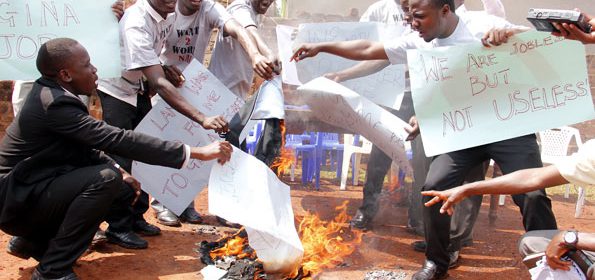President Museveni’s failure to appreciate the weakness of His Government will cause his life.

The challenge that the current regime under the leadership of President Yoweri Kaguta Museveni has faced is “Failure to appreciate that there is a governance problems in Uganda that needs to be addressed. Despite governance failure indicators such as massive corruption and bribery, gross human rights violations, abuse of environmental resources, secrecy and lack of information disclosure in the oil and gas sector, faulted Environmental Impact Assessment studies, land grabbing, faulted community compensations, unemployment, among others both in the Private and Public sectors of the economy and despite the cries and warnings by the Ugandan civil society fraternity, the president has always termed these warning as mere propaganda that have no basis, are western or foreign engineered and therefore less consequential to him ruling the country. He has on many occasions termed the warnings as less representative of real majority Ugandans and concluded that those are mere negative sentiments of the opposition, and other politically frustrated groups working under the influence of western enemies. The president has again on many occasions said that the blames by the civil society and at times by the international community don’t mean anything to him because he hasn’t seen popular Ugandans the majority youths and communities where he gets majority votes come up to show concern over how the Oil and Gas resource and other key national resources are being managed.
Fortunately now as he continues to cling on power, he continues to make many mistakes that have become a wake up call for majority Ugandans especially youths. For Instance since the 2016 presidential elections, Youths and other Ugandans have witnessed government’s move to change the New NGO Law in a move to further silence NGOs, have Witnessed the recent mass killings in Kasese, massive land grabbing in Amuru, extra judicial killing of the community living near Murchison national parks , the massive corruption involving the famous handshake that the president used to re-distribute the 602 million oil money at will to individuals, the president move to influence elections for a speaker of parliament and Legislature ordering parliament not to investigate Money dished out by the president at the Famous Hand shake etc.
The Youths in all the above situations plus Civil Society have stood out as the key constituents opposing government over the above injustices to the extent that they have taken Pigs to parliament as a way of expressing anger over massive corruption in government. Again, the Youths have become more organized under various titles such as Jobless brotherhood, unemployed youths of Uganda, Oil refinery affected youths, among others.
The current national development plan (NDP) and the 2040 National Vision for Uganda clearly provide the framework for the country transit from a poor country to a middle income by 2020. To achieve the above milestone, the new government headed by President Museveni that was elected in February 2016 through controversial elections that were questioned by both national and international observers set a number of targets as a means to achieve their goal of middle income. The targets include: Oil companies get production licenses and the country move swiftly to the refinery and pipeline development to ensure that oil flows by 2020 without fail,address the problems of land ownership to enable bibanja holders become title holders,reduce the cost of electricity tariffs from the current 11 US dollar cents to 6 cents by February 2017,conclude the negotiations for the standard gauge railway to improve railway transport in the country, build minimum 22 industrial parks and massively upscale industrial establishments both for Manufacturing and agro- commodities in a period of five years,ensure zero tolerance to corruption, modernise mineral testing and streamline and regulate artisanal mining,Stop damaging the environment by dealing with forest encroachers and protecting the lake shores,riverines and other life supporting ecosystems, improve service delivery in all sectors from healthcare, to education to feeder roads and others and set up a national airline in the next five years, among others.
It should be noted that some of the above targets, directly or indirectly are as a result of Civil Society organisations previous advocacy engagements, especially the empowerment of youth to participate and influence national development processes for the common good. For example, in the last two years, Civil society organisations and their collaborators have engaged government to strengthen institutions, lower costs of production to create more jobs, ensure revenue transparency, and improve transport and communication, observe good natural resources governance and more importantly commit itself to democracy and human rights observance among others.
